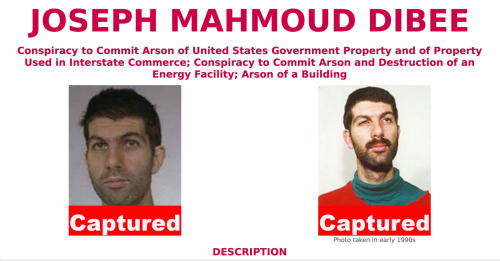Judge denies eco-saboteur’s request for more information
Published 8:30 am Friday, September 23, 2022
As eco-saboteur Joseph Dibee awaits sentencing, his lawyer Wednesday urged a judge to order the government to produce any videos of his arrest in Havana, Cuba, any communications between the U.S. and Cuban governments about Dibee or any money paid to Cuba that helped with the handover of the fugitive.
Dibee, 54, was set to be sentenced next week based on a negotiated plea agreement reached in April, but the sentencing has been postponed until Nov. 1 due to the latest dispute over sharing of evidence.
Dibee, a fugitive for 12 years who was finally tracked down in Cuba in August 2018, pleaded guilty to two counts of conspiracy to commit arson and one count of arson in a string of attacks that destroyed or damaged environmental targets in Oregon and California more than two decades ago. They include a fire he helped set at the Cavel West Inc. meatpacking plant in Redmond on July 1, 1997.
U.S. District Judge Ann Aiken denied most of the requests by Dibee and his lawyers, relying on the prosecution’s responses that either the sought-after evidence didn’t exist, was turned over to the lawyer or wasn’t relevant to sentencing.
“I generally sentence people similarly situated. If I were you, I’d’ spend more time on those arguments than some of these issues that are far afield,” Aiken told Dibee’s lawyer, Matthew Schindler.
The judge said she recognized from the start that the primitive compilation of the immense amount of evidence and how prosecutors shared it with defense lawyers without indexing or a way to electronically search the material would mean the case “was going to take an enormous amount of time and cost a fortune.” The U.S. Attorney’s Office didn’t have a tally of the full cost Wednesday.
Federal investigators said Dibee was part of the largest group of eco-saboteurs ever taken down by the FBI. They called themselves “The Family” — more than a dozen people who committed crimes in the name of the Earth Liberation Front and Animal Liberation Front — and caused an estimated $40 million in damage from 1996 to 2005.
Assistant U.S. Attorney Quinn Harrington has said the government will recommend a sentence of seven years and three months in prison for Dibee. Schindler is expected to argue for time served.
Schindler said he wanted to know if the United States paid Cuba to help facilitate Cuba’s handover of Dibee to the FBI.
“I think Mr. Dibee deserves to know how much the United States paid for this. What did they concede to get this accommodation, because I know you can’t fly into Cuba like that,” Schindler said. “Somehow this needs to happen in a place where we have no relations, and I think it’s fair to ask why.”
Harrington said he shared Cuban paperwork written in Spanish and translated into English on how Cuba was acting according to Interpol reciprocity principles.
Dibee was stopped and held in Havana based on an Interpol red notice that informed Cuban authorities he was a U.S. fugitive, Harrington said. Cuba is a member of Interpol, an international police organization, although Cuba doesn’t always comply with its rules, he said.
Schindler said he also wanted to know how much the government paid any cooperating co-defendants in the case to help prosecute Dibee or if there were warrantless interceptions of communications between Dibee and his alleged co-conspirators.
“Because the universe of information the Court can consider when exercising sentencing discretion is vast, the materiality of the discovery Mr.Dibee seeks should be apparent,” Schindler wrote to the court. “If the United States was aware that Mr. Dibee, a United States citizen, was being tortured by the Cuban government to further its investigation into Mr. Dibee, that could affect the Court’s sentencing discretion.”
Harrington said Schindler’s requests were based on “mere conjecture” and argued that Schindler was “fishing for possible arguments” to make at Dibee’s sentencing.
“It is not enough to say that information is ‘obviously material’ or that it ‘could’ affect the sentencing,” Harrington responded in a court filing. “He must explain why and how. He has not done so. He has offered no more than conclusory statements of mere speculation.”
The FBI has no knowledge of any alleged mistreatment of Dibee in Cuban custody and the United States made no payments to Cuba regarding Dibee’s arrest, according to Harrington.
Prosecutors won’t be calling any alleged co-conspirators at Dibee’s sentencing and he’s not entitled to learn how much money was paid, if anything, to the cooperating co-defendants or informants in the case, Harrington said. Schindler said in court he heard one cooperator may have received $100,000 from the government.
Harrington also said there was no warrantless interception of calls or other communications between Dibee or his alleged accomplices.
Regarding the requests about the U.S. government’s contact with Cuba, those communications are under the authority of the U.S. Department of State and Office of International Affairs, Harrington noted. Dibee isn’t entitled to communications between a foreign government and “non-prosecution” government officials, he argued.
U.S. personnel didn’t take any video of Dibee when they took him into custody in Havana, Harrington said, despite Dibee’s declaration that he saw a federal agent with a handheld video camera. Prosecutors also have no access to any video that may have been taken by Cuban officials, as Dibee also has alleged, Harrington said.
The FBI brought a SWAT medic to examine Dibee before he was flown out of Cuba to make sure he was healthy to fly and to document any injuries he may have suffered while detained in Cuba. Other than insect bites, there were none, Harrington said.
The prosecutor also rejected Schindler’s request for the FBI’s Ten Most Wanted List, saying Dibee was never on it. He noted, however, that Dibee did at one time appear on a separate FBI terrorism most wanted list. The last remaining fugitive in this case, Josephine Josephine Sunshine Overaker, remains on that list.
Dibee pleaded guilty to engaging in a conspiracy to set fire to government buildings and destroy other property, driven by “ideology, and as part of ‘direct actions,’” from October 1996 through December 2005, according to Harrington.
Along with the fire at the Redmond meatpacking plant, Dibee pleaded guilty to conspiracy to commit arson in a fire at the U.S. Bureau of Land Management’s wild horse corrals near Litchfield, California, on Oct. 15, 2001.
The buildings at Cavel West were destroyed, with the loss estimated to exceed the insured value of $1.2 million, according to court records. The fire was designed to end the processing of meat from wild horses slaughtered by the plant.
Dibee was stopped in Cuba in 2018, traveling with a Syrian passport. He has said in court previously that he was flying from El Salvador back to Russia through Havana using a Syrian passport when he was detained and turned over to the FBI.









